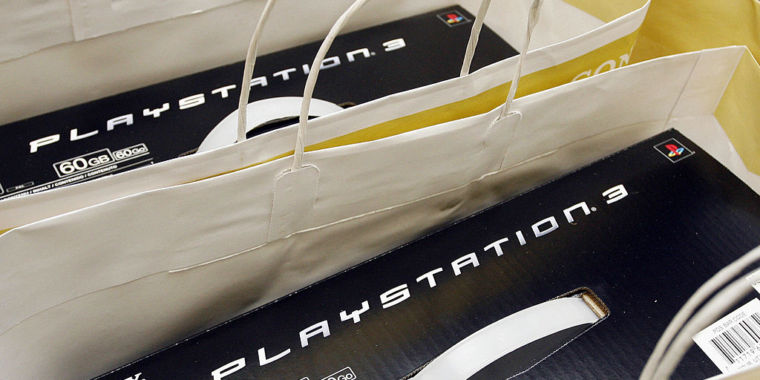A few months ago we reported that the “devil was in the details” about how Sony Playstation 3 owners could go about getting either $9 or $55 from Sony as part of a class-action settlement over a 2010 software update that removed the ability to run Linux on the popular gaming consoles.
The California judge presiding over the litigation is now killing the proposed settlement amid concerns the lawyers representing the class haven’t explained why they should get $2.25 million for their legal services, especially considering that the deal has made it burdensome on gamers to get their cash. Of the gamers who tried to get their $55 refund, 25 percent have been rejected.
“The Court has concerns, based upon how the notice and claims process preceded, the results it produced, and the disproportionality of the attorneys’ fees versus the class recovery, that the settlement agreement is not fair, reasonable, and adequate,” US District Judge Yvonne Gonzalez Rogers ruled, (PDF) a decision that reversed her earlier order that tentatively backed the pact.
Assuming every one of the 11,300 claims were paid at the $55 rate, that would mean the deal is worth $621,500 to consumers. The suing attorneys are charging $2.25 million for their services. The court said as many as 10 million consoles were affected.
The judge added that the process for gamers to request their money contained “unnecessary requirements” that “could only serve to deter claims without any apparent justification.”
What’s more, the judge ruled the lawyers have not sufficiently substantiated their fee request.
This lack of evidence is all the more concerning in light of the fact that the litigation here never progressed beyond a motion to dismiss and an appeal of that motion. While some discovery was apparently conducted, that discovery does not nearly approach the level that would have been required to take the case to class certification, or beyond. Without billing records or some more detailed explanation of the basis for the fee request, the Court is without sufficient information to determine whether the request is reasonable.
The judge ordered the parties to return to court February 13 “to discuss the next steps in this litigation.”
Under the now-dead deal, there were two classes of gamers that were eligible for payouts.
The $55 “Consumer Class A” category is “All persons in the United States who purchased a Fat PS3 in the United States between November 1, 2006 and April 1, 2010 from an authorized retailer for family, personal and/or household use and who used the Other OS functionality after installation of a Linux operating system on their Fat PS3.”
The $9 Consumer Class B category is “All persons in the United States who purchased a Fat PS3 in the United States between November 1, 2006 and April 1, 2010 from an authorized retailer for family, personal, and/or household use.”
Here are some of the hoops that were required for both groups to get the refund: proof of purchase, a console serial number, and the Playstation Network Sign-in ID used with the Fat PS3 between November 1, 2006 and April 1, 2010. Class A members were also required to prove use of the Other OS functionality and a statement under the penalty of perjury that the Linux operating system was installed and used. Consumer Class B members had to provide a statement under the penalty of perjury that they knew about the Other OS functionality and relied upon the Other OS functionality in making the decision to purchase a Fat PS3, “and intended at the time of your purchase to use the Other OS functionality.”
There were also other hurdles, including forcing gamers to obtain a “temporary ID” from the settlement administrator that Sony would use to check against its own records to verify purchase of a Fat PS3. The judge scoffed at that idea:
The purpose of the temporary serial number remains obscure. Indeed, the process appears to be completely circular: notices were emailed to potential class members based on the information in Sony’s Playstation Network ID database, but then class members were required to provide their Playstation Network ID to Sony to look up the associated Fat PS3 serial number in the database. This “remedial” process begs the question of why the claimants were required to provide receipts or serial numbers in the first place, i.e. if Sony already had that information in its database and could simply confirm the claim by using the claimant’s Playstation Network ID. Given the relatively small amount Consumer Class B members would receive, imposing unnecessary requirements could only serve to deter claims without any apparent justification.
About seven million e-mails were delivered on September 28 to consumers who had purchased the box. They had to make a claim by December 22. In all, there were only 11,300 claims made during the 10-week claims period—a statistic that did not please the court.
However, no evidence of these limiting considerations is offered to justify estimating the class to be less than one percent of the total purchasers. Counsel’s failure to provide more than argument about the basis for its estimate of the class size, and thus the claims rate, leaves the Court without a basis for any confidence that the class settlement fairly and adequately compensates the number of people who were using the Other OS functionality before Sony introduced Firmware Update 3.21 and were injured by the loss of that functionality.
The lead attorneys representing console owners, James Pizzirusso and Rebecca Coll, did not immediately respond for comment.
Source: arstechnica.com




